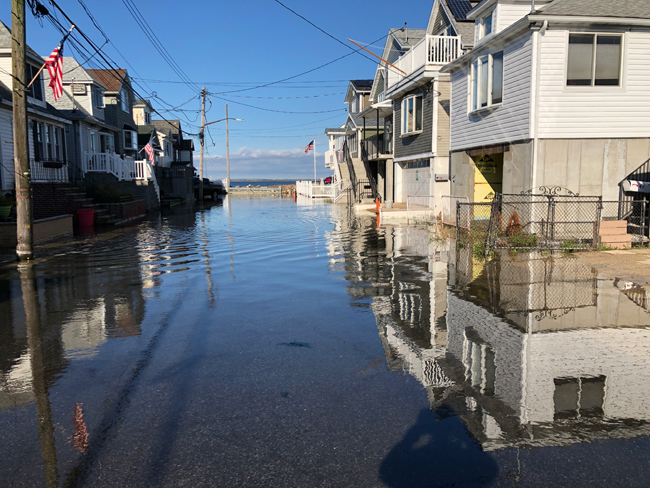
Sunny day tidal flooding in the Jamaica Bay coastal community. Credit: Helen Cheng, NYSG & Science & Resilience Institute at Jamaica Bay
A citizen-community science program launched by NYSG documents coastal flooding in the face of rising sea levels and changing climate conditions
Contact:
Helen Cheng, NYSG Coastal Resilience Extension Specialist, P: 718-951-5415, E: helen.cheng@cornell.edu
Brooklyn, NY, March 2, 2020 - Coastal communities surrounding Jamaica Bay/New York City experience frequent flooding; in addition to storm days, flooding events may occur on days when weather conditions are blue skies and sunny. As forecasters and projections predict that flooding will become more frequent, there is a need to understand the state of flooding locally, to develop flood mitigation plans, and to equip communities with science-based information, tools and resources.
An obstacle for Jamaica Bay communities is that there is no record or documentation of when and where flooding occurs and is most severe. To address this need, New York Sea Grant in collaboration with the Science and Resilience Institute at Jamaica Bay coordinates the Jamaica Bay Community Flood Watch Project, a community-citizen science effort that engages, empowers, and trains residents to document and report flooding and its impacts.
In one year, the project has collected more than 290 reports of flooding, covering 20 events, including sunny day tidal flooding, storm-related flooding, and heavy rainfall. These data, collected by the Jamaica Bay community, have revealed when and where flooding is most severe, the sources of flooding, and other valuable information.
The Jamaica Bay Community Flood Watch Project has also raised awareness of the severity of localized flooding to public agencies, researchers, and other communities.
Community-based knowledge helps to address flooding in frequently-flooded coastal neighborhoods while equipping those neighborhoods with tools and resources that inform decision-making and empower them. This, in turn, creates and supports a strong tie between the needs of the community and the public policy developed to address those needs.
Jamaica Bay Community Flood Watch Project Resources: www.nyseagrant.org/jamaicabay > Flood Watch and www.srijb.org/jbfloodwatch.
The Sea Grant Focus Area for this project is Resilient New York Communities and Economies.
Project Partners:
• Science and Resilience Institute at Jamaica Bay
• Stevens Institute of Technology
• New York City Emergency Management
• New York City Mayor’s Office of Resiliency
More Info: New York Sea Grant and SRIatJB
The Science and Resilience Institute @ Jamaica Bay
(SRIJB) is a research center focused on enhancing environmental,
social, and economic resilience in communities of Jamaica Bay funded by
the Rockefeller Foundation and the City of New York.
New York Sea Grant (NYSG), a cooperative program of Cornell University
and the State University of New York (SUNY), is one of 34 university-based
programs under the National Oceanic and Atmospheric Administration’s
National Sea Grant College Program.
Since 1971, NYSG has represented a statewide network of integrated
research, education and extension services promoting coastal community
economic vitality, environmental sustainability and citizen awareness
and understanding about the State’s marine and Great Lakes resources.
Through NYSG’s efforts, the combined talents of university scientists
and extension specialists help develop and transfer science-based
information to many coastal user groups—businesses and industries,
federal, state and local government decision-makers and agency managers,
educators, the media and the interested public.
The program maintains Great Lakes offices at Cornell University, SUNY
Buffalo, SUNY Oswego and the Wayne County Cooperative Extension office
in Newark. In the State's marine waters, NYSG has offices at Stony Brook
University in Long Island, Brooklyn College and Cornell Cooperative
Extension in NYC and Kingston in the Hudson Valley.
For updates on Sea Grant activities: www.nyseagrant.org has RSS, Facebook, Twitter, and YouTube links. NYSG offers a free e-list sign up via www.nyseagrant.org/nycoastlines for its flagship publication, NY Coastlines/Currents, which is published quarterly. Our program also produces an occasional e-newsletter,"NOAA Sea Grant's Social Media Review," via its blog, www.nyseagrant.org/blog.